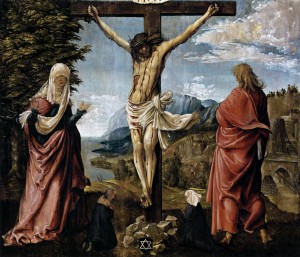
The Blessed Virgin Mary Receives Personal Prophetic Words
And Simeon blessed them and said to Mary his mother, ‘Behold, this child is appointed for the fall and rising of many in Israel, and for a sign that is opposed (and a sword will pierce through your own soul also), so that thoughts from many hearts may be revealed.’
Luke 2:34-35
On this blog, we have discussed the word of prophecy (1 Cor. 12: 10), its importance during the season of Advent, and how to respond when given a confirmed prophetic word. Today’s post focuses on the Blessed Virgin Mary as a model for receiving and acting on prophetic words. Luke 2:25-40 describes two prophetic ministers, Anna and Simeon, reaching out to Mary when the baby Jesus is being presented at the Temple for circumcision.
Simeon was united in Christ in righteousness, “righteous and devout” (v. 25a), yielded to Christ trusting his delay, “waiting for the consolation of Israel” (v. 25b), and remained in Christ enjoying his manifested presence, “Holy Spirit was upon him” (v. 25c). Simeon was intimate with God for Simeon knew his voice, “you would not die” until he sees Messiah (v. 26), and Simeon was led by the Spirit for he was directed by the Spirit “into the Temple courts” (v. 27).
Simeon’s prophetic word consisted of two parts: public in Temple (v. 29-32) and private to Mary (v. 34-35).The public pronouncement focuses on Jesus–God’s salvation found in the baby. This salvation is for the Gentiles and the Jews bringing about the healing of the nations.
Simeon’s personal word to Mary is strangely negative: the proud, self-absorbed, self-assured, and hard-hearted will be revealed (v34-35). Israel will resist Jesus’ ministry, and as result, their worldly, unbelieving hearts will be exposed.  In turn, Israel’s rejection of Mary’s son, the Son of God, will break her heart as well. [Stephen D. Swihart, ed., Logos International Bible Commentary (Plainfield, NJ: Logos International, 1981), 439.
Some may ask why Simeon’s word of prophecy is negative in tone, “Are not all prophecies to be ‘strengthening, encouraging, and comforting'” (1 Cor. 14:3)? “Are not all prophecies to be positive and uplifting”? A prophecy can contain a rebuke, correction, or warning and still be comforting and healing. When Jesus corrects or rebukes, he also gives the grace, the Holy Spirit’s enabling power, to obey his word of command. Jesus gives prophetic words to the seven churches of Asia: five of the seven are rebuked or corrected for their lack of holiness, obedience, or perseverance. Yet, all five are encouraged, graced, and offered a reward for choosing obedience (Rev. 2 & 3).
Simeon’s warning to Mary is the Holy Spirit’s way of helping Mary avoid the pain and shock of unexpected suffering and rejection. It is good that Mary knows now that her precious child’s future death will break her heart in the painful of ways–the Cross.
Anna, a female prophetess, lived her entire life in the Temple courts: she was dedicated to worship, fasting, and praying. Anna represents wholehearted devotion to God and his presence (Luke 2:37). Like Simeon, spending time in God’s presence means knowing God’s heart, and to know God’s heart is to hear his voice, and to hear God’s voice is know his ways. Immediately after Simeon’s word, Anna confirms that this child will bring about the redemption of Israel (Luke 2:38). To be the redeemer of Israel is to be the Messiah, the chosen one, who would free Israel from her bondage. Anna’s word further confirms to Mary and Joseph that the God of Israel has major plans for their son, bigger plans than they can imagine.
Luke does not record the Blessed Virgin Mary’s response to these two words, but we know that in another situation, she chose the “ponder these things in her heart” (Luke 2:19 KJV). Pondering is not passivity. Pondering says to God, “I trust your prophetic word, I may not understand it, therefore I will not talk about God’s instruction until he reveals its meaning to me.” Pondering is faith, pondering is waiting on God, pondering is giving God opportunity and time.
Mary’s humble acceptance of the divine will is the starting point of the story of the redemption of the human race from sin.
Alan Richardson, The New Book of Christian Quotations, comp. Tony Castle (New York, Crossroad, 1982), 158.
In summary; Advent is a unique time for hearing and obeying God’s prophetic word. Like Simeon and Anna, we are called to Spirit-waiting, Spirit-listening, Spirit-anticipation, and Spirit-obedience. Like Elijah and the Blessed Virgin Mary, we are called to Father-directed submission, Spirit-led action, and Christ-follower trust. The Holy Spirit still speaks through the gift of prophecy. As we anticipate Christ’s second return, we can expect more guidance from our heavenly commander.
Come, Lord Jesus, Come!





